For Black History Month, KU student-athletes share their stories: ‘To be strong is beautiful’
LaVannes Squires was more than just a first.
Yes, he was the Kansas men’s basketball team’s first Black player, but his arrival in Lawrence in 1950 forever changed the course of KU Athletics.
Squires, who died in February 2021, endured the disgusted looks, insults and hardships to pave a path for Black student-athletes at a predominantly white institution. But he wasn’t the only one whose presence changed the athletic department.
Marian Washington helped raise the profile of Black women as basketball players and coaches.
As a player, Washington was one of two Black women who were the first to play for the United States National Team. She also played college basketball at West Chester State University, where she helped her team to the first-ever national title for women’s college basketball in 1969.
As a coach, Washington led Kansas women’s basketball to a record of 560-363 from 1973-2004 and became the winningest coach in program history. In addition, she became the first Black woman to serve as the coach of a U.S. team for international competition in 1982.
Earlier in February, Washington was selected as one of the finalists for the Naismith Memorial Basketball Hall of Fame. Her presence continues to inspire those in the athletic department today.
With that as the backdrop, and as Black History Month comes to a close, The Kansas City Star spoke with three women’s athletes at Kansas. They shared their stories of what it means to be a Black athlete at KU, where they say coaches have embraced them and made an effort to listen and learn.
Malkia Ngounoue, tennis
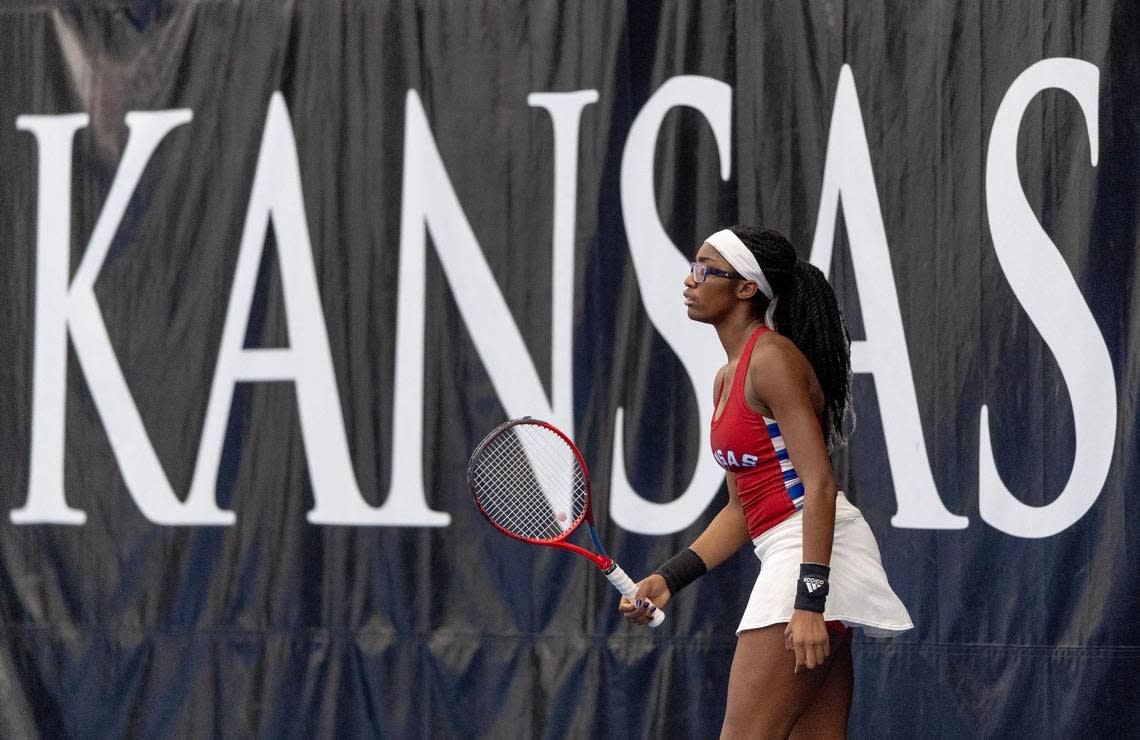
Malkia Ngounoue couldn’t help but clench her fists.
She was 21 and playing in the first round of a doubles tennis tournament last summer in Santo Domingo, in the Dominican Republic, when she heard it — the same comment she’d heard all her life.
Usually, it didn’t bother her, but this day was different. As told by Ngounoue, the opposing doubles pair, an older white woman and a woman she described as being of Asian descent, approached the chair umpire during the first set.
They accused Ngounoue of being a man because she was tall and aggressive. She tried to suppress her frustration, but she was terrified.
The umpire didn’t suspend the match or order a drug test, but the spiteful comments worried Ngounoue. The stereotype of masculinization of Black women in sports has been documented by a number of high-profile figures, including tennis star Serena Williams, who Ngounoue looks up to.
“People would say I was born a guy, all because of my arms or because I’m strong,” Williams said in a 2018 cover story for Harper’s Bazaar. “I was different to Venus (Serena’s sister): She was thin and tall and beautiful, and I am strong and muscular — and beautiful. But, you know, it was just totally different.”
In this case, it sparked a certain fire inside Ngounoue as she played on the court. But every match is a delicate balance. She often battles between being her authentic self and suppressing her personality to fit the prim formalities of tennis.
She says the incident last summer illustrates how her on-court behavior can leave her open to unwanted attention and prejudice. Ngounoue has used her platform as a KU athlete to speak about that on social media.
“I have a teammate that’s as tall as me and the way she moves is very feminine,” Ngounoue told The Star. “If she yells on the court, there is no way in hell anyone is going to look at her and think, ‘Oh, she’s a man.’”
“That’s what angers me. … I would say there might be some different treatment because of that — her being a white woman and me being a Black woman. We are the same height and we’re both dominant on the court, but only one of us is being called a man. Only one of us is being called aggressive. Only one of us is being told, ‘Hey, chill out.’”
Now a “super-senior” in her final year of NCAA eligibility, Ngounoue chose Kansas five years ago over Georgia Tech, Virginia, North Carolina and others because she felt the school allowed her to be herself and work on her mental health.
And she has flourished at KU — she made the All-Big 12 first team for singles in 2021 and was a second-team selection on both the singles and academic All-Big 12 teams in 2022.
But there’s another part to her story. Ngounoue said she deals with childhood trauma and was bullied a lot due to her skin color. She described working through complex post-traumatic stress disorder and said tennis is an outlet for her emotions.
“Tennis allows me to show that passion that I have,” she said. “With having borderline personality disorder and complex PTSD … it’s just like a whole whirlwind of anger. I don’t feel like I can cry or do other stuff, so it turns into stuff.
“I had to learn to channel it, so I’m not going out and breaking rackets. ... The (tennis court) is my one sanctuary where I can let it all out. I don’t give a (crap) if you call me a man because I’m winning.”
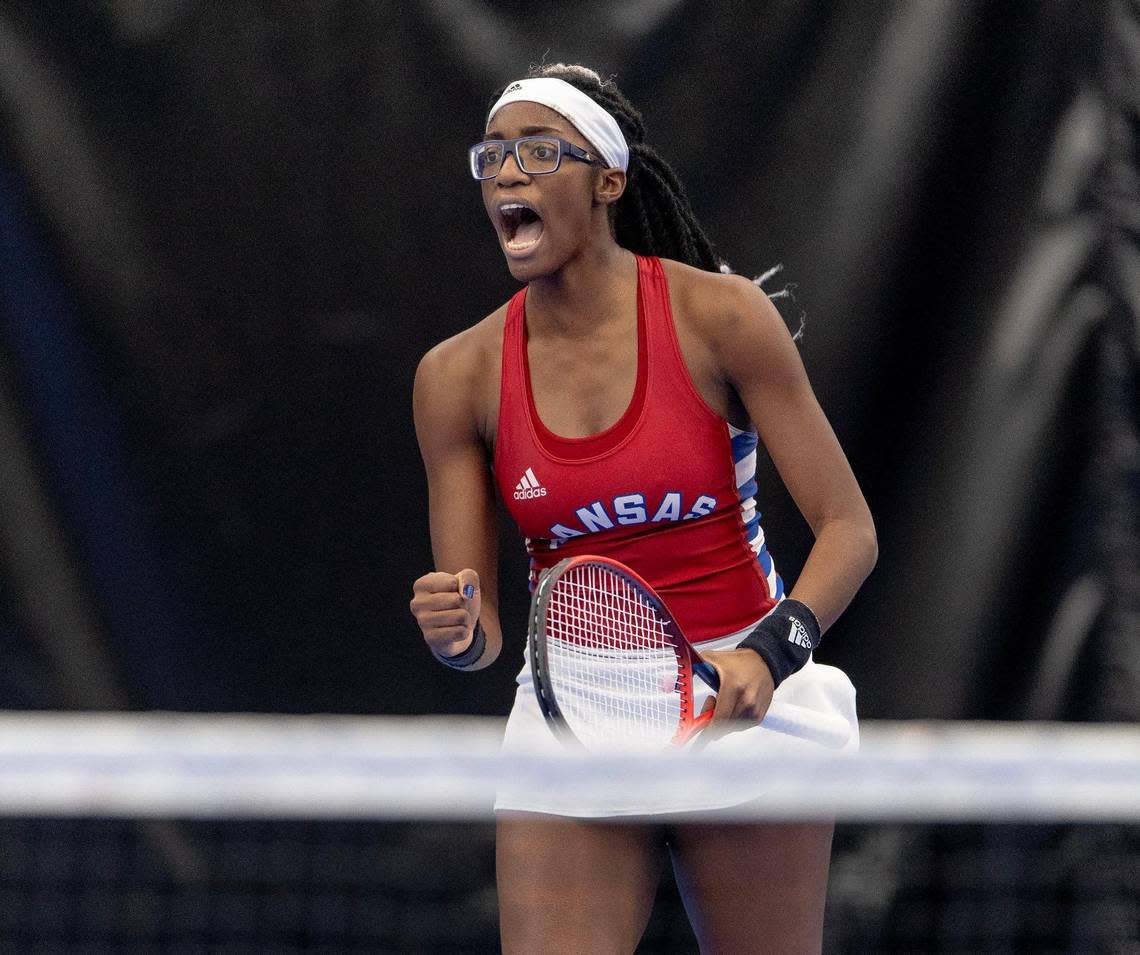
Ngounoue has become more vulnerable with her non-Black teammates over the years — “I don’t mind because I know mental health needs to be talked about a lot more, especially in the Black and brown community” — but she still feels some pressure to “code-switch” around her white teammates.
“Coming in, I would have to talk a little bit more proper, kind of hide a lot of my personality in fear of being called ghetto,” she said. “When I am with my Black friends, I am still that bubbly and stuff, but certain words come out. Certain mannerisms come out that wouldn’t come out with my white teammates.”
She likes to educate her teammates and others about these issues, but she doesn’t feel it’s solely on historically underrepresented communities to educate and inform.
“I’m lucky to be blessed with teammates who may not be knowledgeable on matters when it comes to race, but they are open to learning,” Ngounoue said. “They are open to asking questions and being respectful either way about it.”
And they don’t judge when Ngounoue plays with passion and strength, much like her idol once did.
Chandler Prater, women’s basketball
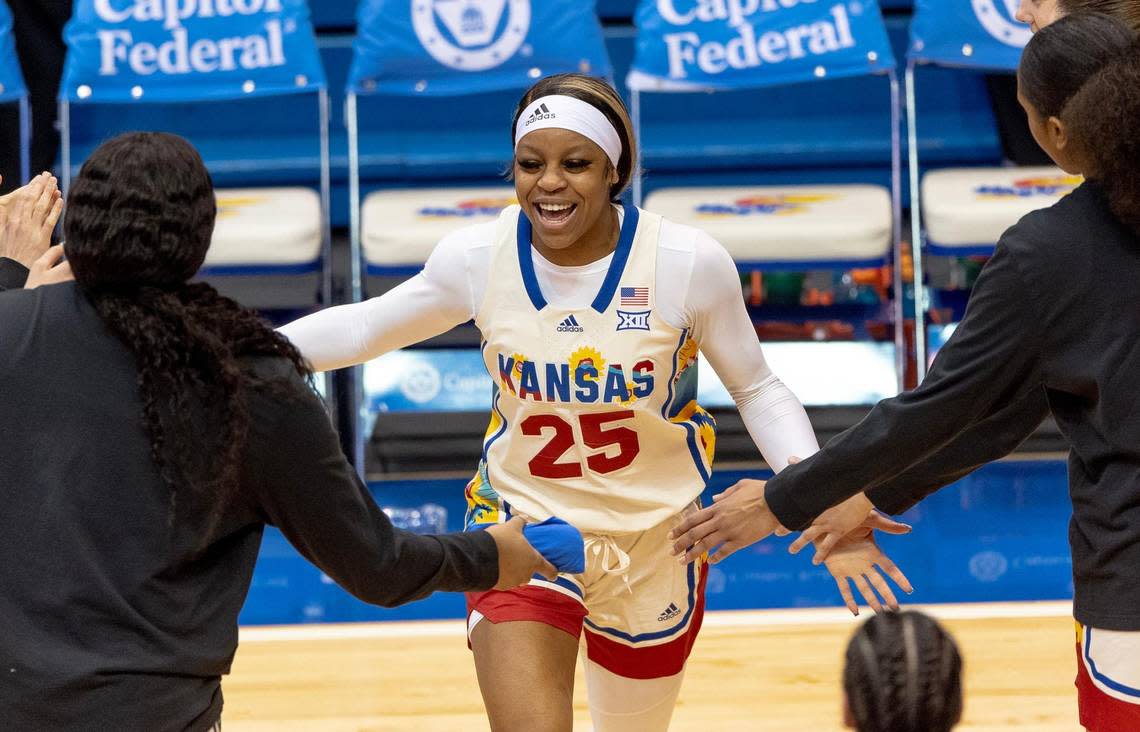
Last summer, Chandler Prater walked into a Kansas City gym with a huge smile. She surveyed the room and couldn’t believe her eyes: A large crowd had assembled for her basketball skills camp.
Girls ranging in age from 9 to 14 stared at Prater — girls who looked like Prater and viewed her as a role model.
Prater, a Kansas City native, is a starting guard for the Kansas women’s basketball team. She’s averaging eight points and just under five rebounds per game in a season that has included breakout performances of 19 points against TCU, 19 more in an upset of a ranked Arizona team and 15 points and 10 rebounds — the first double-double of her KU career — in a blowout victory over UT-Rio Grande Valley.
She’s embraced her platform as a Black student-athlete on a diverse women’s basketball team at KU to advocate for the causes in which she believes.
“I feel like that has given me an opportunity to really showcase how much I care about my community,” Prater told The Star.
Prater is all about brand building — she believes NIL (Name, Image and Likeness) has helped level the playing field for minorities. She credits Mass Strategies, the NIL collective working with many KU student-athletes, with helping her network and better understand the business world.
“Coming out of college, it can be hard for women, especially Black women, to find career pathways and certain things to get into,” Prater said. “(NIL) builds our financial awareness and our business awareness. Now is the time we get to take control of our own destiny in a way.”
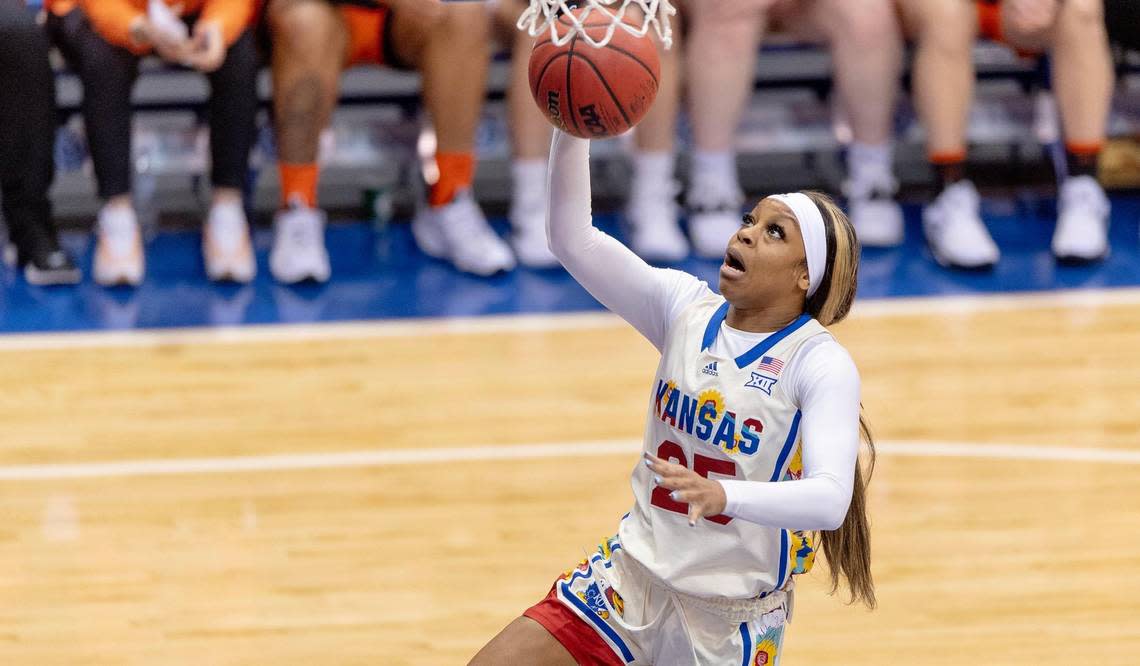
Perhaps the most important part? Meeting Black women who are entrepreneurs — a group Prater hopes to join one day.
“I feel like I get a step closer to my goal when I meet people who are like me or look like me in those positions because, nine times out of 10, those people want to help you,” she said. “Those people want to see you win — just like they were in (your) position however long ago.”
Prater takes pride in being a Black female student-athlete at KU. She tries to be herself on and off the court, but sometimes it’s a difficult task.
“It’s a growing process in understanding how to express yourself,” she said. “It’s a professional setting, so speaking my mind in a way that represents myself in the right way, it’s kind of a growing pain.”
Overall, Prater feels heard at KU.
A few years ago, the women’s basketball team organized a Black Lives Matter march. Nearly all of her professors and KU coaches showed support.
That meant a lot to Prater, that they genuinely cared about Black athletes and their support wasn’t just a facade.
It allows Prater to authentically be herself. She has a support system.
London Davis, volleyball
London Davis only knows one way to fit in: by being her best on the volleyball court.
She’s one of a few Black women’s volleyball players at KU, and she holds herself to an almost untenable individual standard in a sport where it takes a lot for one player to significantly affect a match.
That mentality earned her a scholarship for Kansas volleyball three years ago — and it helped her as she posted a season-best 22 kills in a win at Kansas State this past year.
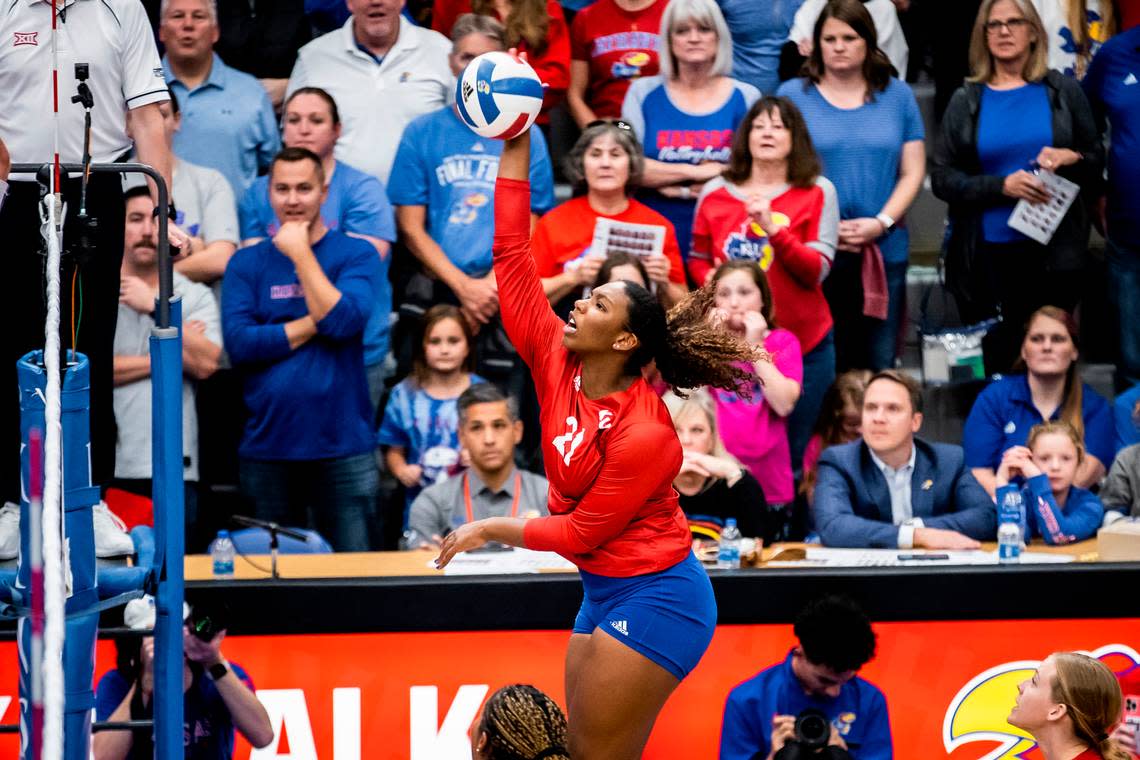
Davis first put that pressure on herself at Olentangy Orange High School in Ohio: “If I am going to be good at something,” she said, “I’ve got to be the best at it.”
“It was self-inflicted stress and pressure I put on myself,” Davis continued. “Growing up being different, I felt that was what made me fit in or made me want to be accepted by everybody: being the best.”
Nowadays, Davis feels at home in Lawrence. Although she remains one of only a handful of Black volleyball players there, the coaches at KU make her feel included and welcome.
Davis is heavily involved in RISE — an organization “that strives to bring together student-athletes of different cultures, ethnicities, lifestyles, and belief systems to enhance their experience,” per the KU Athletics website, “and dedicates itself towards providing a safe space and community for any student-athlete who identifies as a minority.”
She also participates in a diversity and inclusion program led by Paul Pierce II, Kansas’ Associate Athletics Director for Inclusive Excellence. Pierce teaches Davis and her peers a variety of lessons, including how to respond to microaggressions and connect with teammates of all races.
Still, Davis wishes her team was more diverse and tries to educate her teammates on the things they might not understand.
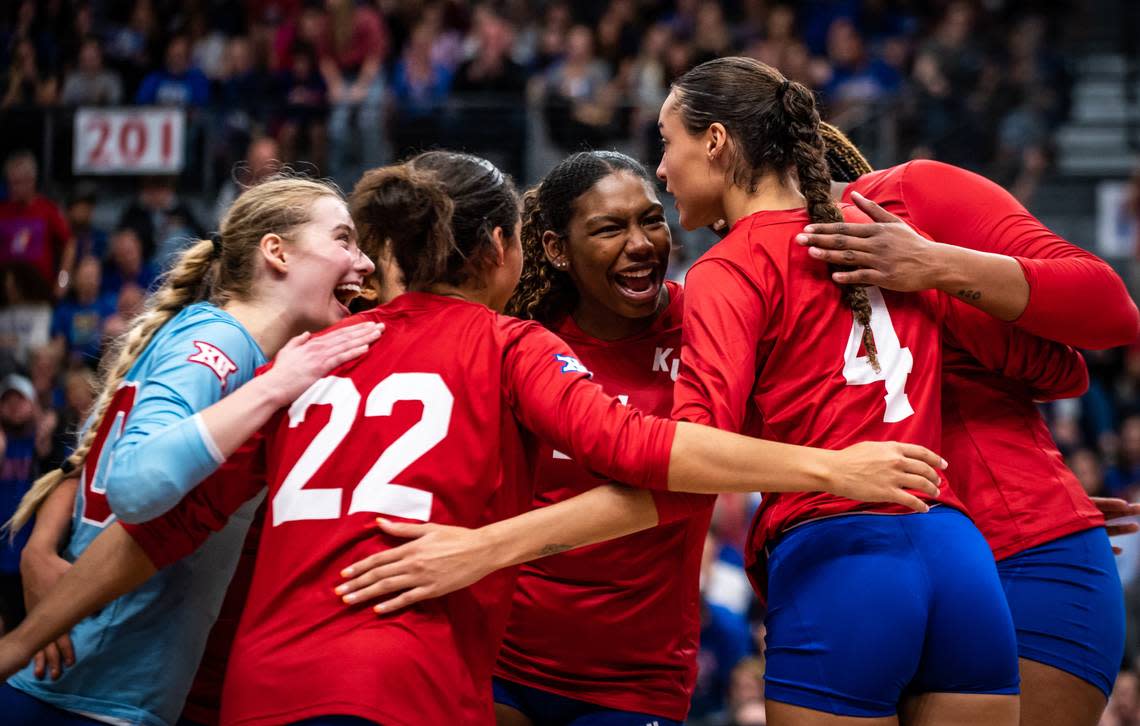
“I like that I have the platform to educate them on these things,” Davis said. “At the same time, it would be nice having somebody being able to relate to you in those situations. I guess as much as the coaches try and relate or see the other side, it’s just not the same.”
For example, Davis has talked with her parents about what to do if she’s in a situation with a police officer. It’s a conversation many of her teammates may not have had with their parents.
She leaves her car registration somewhere visible and easily accessible in case she ever gets pulled over. “One of my teammates, when she pulled it (out), she was like, ‘Why don’t you just keep (the registration) in your glove compartment?’ It’s things like that.”
Ultimately, Davis considers her identity a strength and is honored to be among the Black volleyball players at KU. In fact, KU Athletics recently honored another storied Black volleyball player as part of Black History Month.
For the next generation
Throughout February, KU has recognized Black athletes as trailblazers in their respective sports. That includes Marian Washington, one of Prater’s personal favorites. The women are connected by basketball and more.
Prater, a redshirt-sophomore, has been at KU for three years now, so she knows well the experience of being a Black student-athlete.
“You have to find people who love and support you for who you are,” Prater said. “Especially being on the women’s side and understanding how gigantic the men’s basketball program is here. Understanding that the people who support us, our fans, we just have to give that back to them.
“Being a Black woman, it’s just showing up as myself and understanding that’s good enough no matter what.”
One of the first Black women highlighted in the Trailblazer Series was former volleyball star Kelsie Payne, who left KU as the program’s all-time kills leader and a Big 12 Player of the Year, and helped lead the Jayhawks to a Final Four.
She brought @KUVolleyball to new heights, and finished her career as one of the greatest to ever wear the Crimson & Blue
This is what makes @KelsiePayne a trailblazer.#BlackHistoryMonth x Marian E. Washington Trailblazer Series pic.twitter.com/MYF4MOhGrs— Kansas Jayhawks (@KUAthletics) February 1, 2023
Davis hopes she can follow in those footsteps.
“It’s so cool seeing little girls that I grew up being (like) and seeing the people that look like me in these positions,” Davis said. “(It’s important to) be one of those people and be like a role model for these girls, especially because growing up I didn’t see very many Black women in volleyball.
“I think there are more people joining now. It’s really cool just to see the little girls come up and be like, ‘Oh, my gosh, you are my role model.’”
With that platform, Davis offers a piece of advice to the next generation: “Don’t determine your worth with how you perform — just go out and play.”
Ngounoue, too, understands the importance of having someone to look up to. She aspires to play professional tennis after college and sees a lot of herself in Serena Williams. She aspires to reach that level of strength someday.
“To be strong is beautiful,” Ngounoue said.
Overall, Ngounoue credits the Kansas Athletics staff, from athletic director Travis Goff to her tennis coaches, for being willing to learn and listen to the struggles of Black women.
As for her advice for the next generation of Black student-athletes at KU?
“Try really hard not to put up your walls when you come here,” Ngounoue said. “It may look like a really white campus and all that, but continue to look around and you will find people. People that, no matter what, are willing to listen, willing to learn.”
